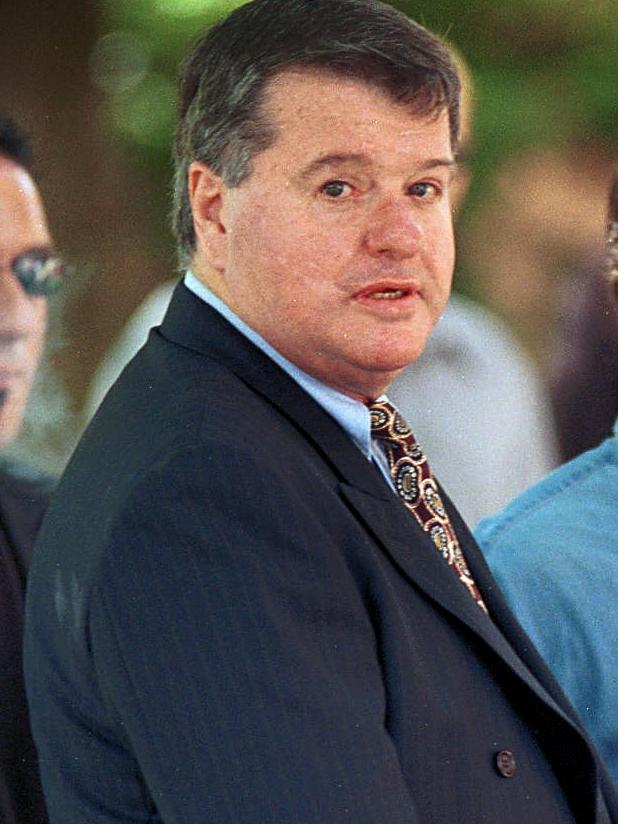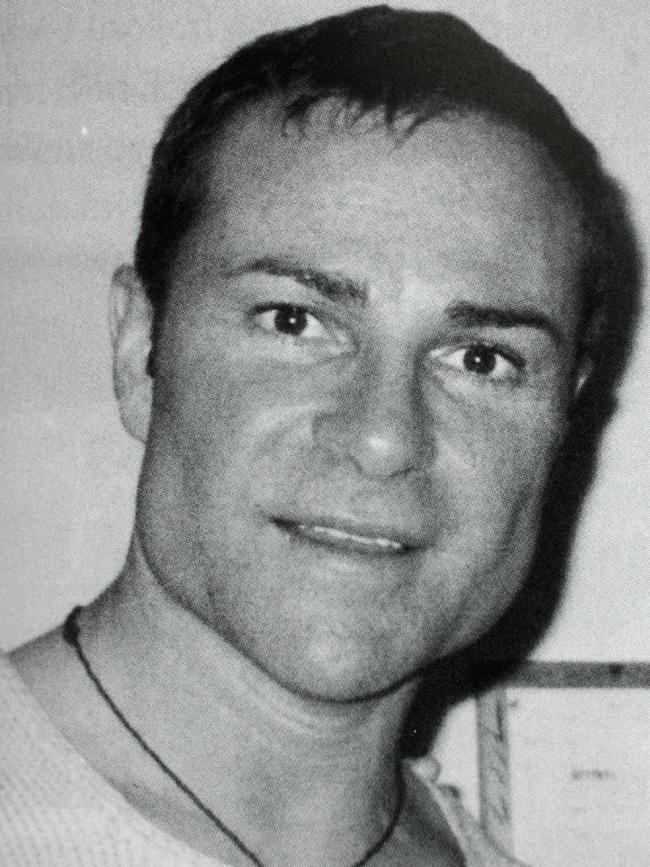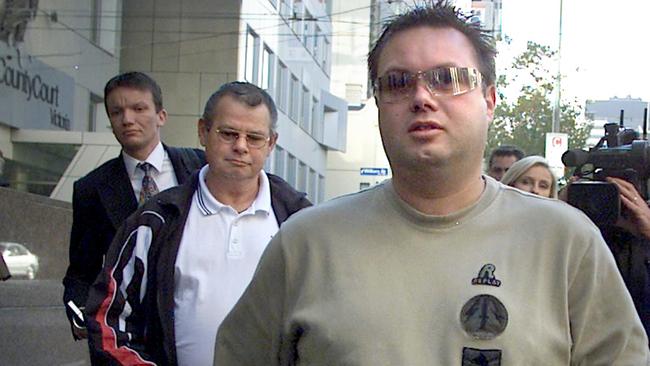Lawyer X’s string of betrayals torched the underworld rule book
In the underworld, secrets that don’t stay secret can get you killed or locked up. Yet cunning criminals who would hardly trust their mothers, mostly trust lawyers the way churchgoers used to trust priests. At least, that’s the way it was until Lawyer X torched the rule book with a string of betrayals, writes Andrew Rule.

Crime in Focus
Don't miss out on the headlines from Crime in Focus. Followed categories will be added to My News.
In the underworld, secrets that don’t stay secret can get you killed or locked up a long time. Yet cunning criminals who would hardly trust their mothers, let alone police or other crooks, mostly trust lawyers the way churchgoers used to trust priests.
They are suckers for confidentiality because it’s so rare in their dog-eat-dog world.
An example — Lewis Moran, the late underworld figure fatally close to the heart of the underworld war, once told a lawyer he knew exactly who had killed the gangland gunman Dino Dibra. He also knew why.
READ MORE:
THE LAWYER X SCANDAL EXPLAINED
WORST DRUG CRIMS COULD WALK FREE WITH COMPO
>> FOLLOW EVERY TWIST IN THE LAWYER X SAGA HERE
GET THE LIFE & CRIMES PODCAST ON ITUNES, WEB OR SPOTIFY
Intrigued, the lawyer asked the feared old-time crook why he was so sure he had the answer to a murder that police had not been able to crack.
“Because I killed him,” Moran replied as if he were talking about a parking ticket.
It was simple, Moran explained: killing the violent Dibra (at Sunshine in October 2000) was payback for the murder of his stepson Mark Moran outside his Aberfeldie home exactly four months earlier. An eye for an eye, a bullet for a bullet.
The lawyer didn’t doubt the story. Still doesn’t. He was probably the only person alive that Moran would trust with a murder confession, which had come up in a conversation about police and media theories that Carl Williams “pulled the trigger” on Mark Moran.
The Dibra story was another secret “in the vault”.
The lawyer told no one until long after Moran was shot dead by a hitman at the bar of the Brunswick Club in 2004.
As a legal advocate, he wasn’t big on propriety, but confidentiality always mattered — which explains why lying, cheating crooks trust some lawyers with truths they won’t tell anyone else.


At least, that’s the way it was until Lawyer X torched the rule book with a string of betrayals that some people guessed at long before the news of her being a double agent filtered through police and legal circles to the underworld.
“I could never work out why I lost clients to her,” says one veteran barrister. “Maybe I couldn’t give the same service.”
“I never trusted her,” a retired criminal lawyer said flatly this week.
Neither did well-known “gangland lawyer”, Zarah Garde-Wilson, the quiet achiever who has spent the last week explaining to anxious relatives and others outside the legal bubble that, no, she is not Lawyer X.
In fact, during the gangland war Garde-Wilson actually warned people not to trust Lawyer X. Garde-Wilson, as careful and considered as Lawyer X was outspoken, says her professional rival hated her “because I told people she was a police informer.”
RELATED CONTENT:
MELBOURNE’S GANGLAND WAR TIMELINE
THE HITMEN BEHIND MELBOURNE’S BLOODSHED
THE DOWNWARD SPIRAL OF UNDERWORLD WIDOW WENDY PEIRCE
Garde-Wilson’s shrewd deduction probably explains why Carl Williams described Lawyer X as a “dog” (informer) before it was common knowledge, not that it helped him once he decided to do some informing of his own in jail.
The handling of Williams after his arrest in 2004 tells us something about what led police to “turn” a criminal lawyer into an informer: a belief at police headquarters that desperate and dangerous times require drastic remedies, a fact easily overlooked in hindsight.
In January 2009, the Herald Sun reported that police had secretly arranged to give Carl Williams — drug dealer and convicted murderer — an eight-day “Christmas holiday” away from his high-security cell at Barwon Prison.
The story, by chief police reporter Mark Buttler, implied Williams was repaying the favours with information — notably about the execution of Terry and Christine Hodson at Kew in 2004, a crime that struck at the heart of law enforcement.

It was clear that police command believed it was worth the risk of being seen to humour a convicted killer because, in such a high-stakes case, the ends can justify the means.
If the police brains trust thought it necessary to shout Williams a beach holiday with his father, also a prisoner (there were even rumours of prostitutes hired to sweeten the deal) it follows the same authorities would horse trade with a maverick lawyer willing to sell out her criminal cronies and contacts, if not clients.
After all, police had got into bed before with criminals and their consorts in pursuit of a higher purpose.
In a previous crisis — the doomed attempt to solve the “Walsh St murders” of two young policemen — unhappy detectives were ordered to sneak a key Crown witness, Wendy Peirce, to a Ballarat nightclub and cheap motel so she could “pick up” because she was bored with witness protection.
Then there was the strange case, much earlier, where police spirited a dangerous prisoner out of prison for a night with his wife, who was desperate to cover up the fact she was newly pregnant to another man and was scared the husband would harm her if he twigged he wasn’t the baby’s father. The police were keen to keep the woman alive and “on side” and so they set up the elaborate liaison.
Sex played a part in both those stories and so it was with Lawyer X, alias registered informer 3838. She could just as easily have been dubbed Lawyer X-rated.
Salacious stories are like water — they trickle down from high places to low.
Well-informed legal insiders have for years heard the whispers about the convent girl they now say became the ultimate love rat, the Mata Hari of the Melbourne Bar, among other bars.
Hidden in the tangled story of clients, cronies, bent cops and hard crims is the fact that Lawyer X the barstool pigeon gathered some intriguing information in the bedroom.

At least one of her bedmates must have been puzzled because it is hard to hide a recording device when you’re as naked as a rattlesnake.
Later, the lover must have realised he’d been sleeping with the enemy. But it might never have occurred to him that the “bug” transmitting the event was hidden in a hair clip artfully modified by technicians. A ploy straight from James Bond.
There are a million stories in the naked city and now that is one of them.
But the supposed details of informer 3838’s bedroom antics on either side of the law do not throw much light on her motivation.
Why would she play such a dangerous game? One tempting answer is that she could: she relished a “chess game” in which the pieces were real people and the stakes were life-changing, even life-ending.
But this idea of a strategic “genius” amusing herself might be glamorising a more sordid reality.
Somewhere in a long and expensive Royal Commission, various things might emerge.
Among them, perhaps, evidence that Lawyer X — a middling junior barrister — was in some ways just another informer, a flawed and compromised character willing to spy for police and betray “friends” to save her own neck.


Her weakness for bad company showed up early. One version of events is that it went back to her university days, when her housemates were arrested in raids that could have ruined her legal career before it even started, had she not avoided being charged.
Then there is the story, circulating in legal and police circles, that she was recorded in a conversation with a drug dealer and a bent policeman that effectively made her a party to a conspiracy. That recording, some lawyers suggest, meant she could be made an offer she couldn’t refuse.
Wise criminal lawyers steer clear of their clients outside court. But not all criminal lawyers are wise. Some are greedy as well as egotistical.
Some, like Lawyer X, have felt compelled to have their fingers in many pies.
When Lawyer X was an articled clerk with a respected law firm, she wanted to earn more. That’s why she sold pies at the MCG on game days.
One of her fellow pie sellers, a law student, recalls her clearly as a young woman with a strangely belligerent attitude.
“What was she like? She was large and loud and angry.”
LAWYER X SAGA:
PART 2: THE BETRAYAL OF THE HODSONS



